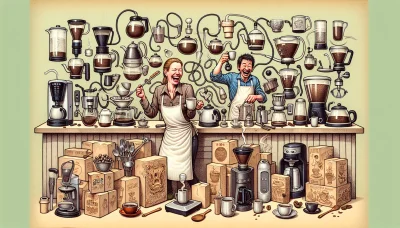Career and Finance in Brewing Quiz
Test Your Knowledge
Question of
Career and Finance in Brewing: An Overview
The realm of brewing, particularly in the contexts of tea and coffee, offers a rich tapestry of career and financial opportunities. This sector not only involves the intricate processes of selecting, roasting, and brewing premium leaves and beans but also encompasses a wide range of activities including product development, marketing, and sales of related accessories and equipment. Professionals in this field can find themselves working in diverse environments, from artisanal coffee shops and tea houses to large-scale production facilities. The financial aspects are equally varied, with potential for entrepreneurship in creating unique blends or innovations in brewing technology. As consumer preferences evolve towards specialty and craft beverages, the industry continues to expand, offering robust career paths and investment opportunities in the ever-growing culture of tea and coffee consumption.
The Art of Brewing: Tea and Coffee
Brewing tea and coffee is an art form that requires a deep understanding of various factors to achieve the perfect cup. For tea, it involves knowing the right temperature and steeping time for different types of tea leaves, such as green, black, oolong, or herbal, as each has its unique requirements. Similarly, coffee brewing demands knowledge of grind size, water temperature, and brewing time to extract the optimal flavor from the coffee beans. Mastery over these techniques, along with the choice of quality leaves or beans and the use of appropriate brewing equipment like French presses for coffee or teapots and infusers for tea, can significantly enhance the drinking experience. Additionally, understanding the nuances of flavor profiles and the origin of tea leaves or coffee beans adds an enriching layer to the brewing process, making it not just a daily routine but a journey into the culture and tradition behind these beloved beverages.
Career Opportunities in Tea and Coffee Brewing
- Barista
- Tea Blender
- Coffee Roaster
- Quality Control Specialist
- Café Manager
- Product Development Specialist
- Supply Chain Analyst
- Tea Taster
- Specialty Coffee Buyer
- Coffee Shop Owner
- Tea Cultivation Expert
- Coffee Processing Technician
- Tea and Coffee Educator
- Marketing Specialist for Tea and Coffee Products
- Sustainability Coordinator in Tea and Coffee Production
Financial Aspects of Brewing Business
The tea and coffee brewing industry presents a unique blend of challenges and opportunities for entrepreneurs and business owners. Financial considerations in this sector range from the initial investment required for equipment, such as high-quality brewers, grinders, and espresso machines, to the ongoing costs of sourcing premium tea leaves and coffee beans. Moreover, the location and ambiance of a café can significantly impact startup and operational expenses. Successful businesses in this industry often benefit from a keen understanding of their target market, allowing them to cater to specific consumer preferences with unique blends and brewing techniques. Potential earnings vary widely, influenced by factors such as brand differentiation, customer loyalty, and the ability to scale operations efficiently. With the global popularity of tea and coffee, businesses that innovate and maintain high standards of quality have the potential to achieve substantial profitability in the long term.
Starting Your Own Brewing Business: A Step-by-Step Guide
- Market Research: Begin with thorough market research to understand the demand for tea or coffee in your target area, identify your competitors, and find your niche.
- Business Plan Development: Create a detailed business plan outlining your business model, vision, mission, financial projections, and strategies for marketing and operations.
- Legal Requirements: Register your business, obtain necessary licenses (such as a food handler's license), and understand the regulations related to tea or coffee brewing businesses in your region.
- Funding: Determine your startup costs and explore funding options such as loans, investors, or crowdfunding to cover these expenses.
- Location Selection: Choose a location that is accessible to your target market and suitable for your business model, whether it’s a retail shop, a café, or an online store.
- Supply Chain Management: Establish relationships with suppliers for high-quality tea or coffee beans, equipment, and other necessary materials.
- Product Development: Develop your product line, including different types of teas or coffees, blends, and any related products you intend to offer.
- Branding and Marketing: Create a strong brand identity and implement marketing strategies to build awareness and attract customers. Consider social media, content marketing, and traditional advertising.
- Staffing: Hire knowledgeable and passionate staff to help run your business efficiently and provide excellent customer service.
- Launch: Plan a soft launch to test your operations and adjust based on feedback, followed by a grand opening to officially start your business.
- Operation and Growth: Monitor the daily operations closely, gather customer feedback, and continuously look for opportunities to improve and expand your product offerings and market reach.
Investment and Funding Options for Brewing Businesses
For entrepreneurs looking to start their own tea or coffee brewing business, understanding the variety of investment and funding options available is crucial. Initially, personal savings often serve as the primary source of capital, allowing for maximum control over the business. Friends and family can also be a supportive source, offering loans or investments under more flexible terms. Crowdfunding platforms present a modern approach to raising funds, enabling businesses to validate their concept while securing the necessary capital. Angel investors and venture capitalists are suitable for those seeking significant investment, offering expertise and networks in addition to funds, albeit often in exchange for equity. Small business loans, available through banks or government programs, provide a traditional route with structured repayment terms. For businesses focusing on innovative or sustainable brewing techniques, grants from government bodies or private organizations might be available. Lastly, strategic partnerships with suppliers or established brands in the tea and coffee industry can offer both financial support and valuable market exposure. Each of these options comes with its own set of advantages and considerations, making it important for brewing entrepreneurs to carefully assess their business needs and goals when choosing their funding path.
Case Study: Successful Brewing Businesses
| Business Name | Type | Start-Up Costs | Annual Revenue | Key Success Factors |
|---|---|---|---|---|
| Bean There Brewed That | Coffee | $75,000 | $500,000 | Exceptional quality beans, strong brand identity |
| Tea Time Ventures | Tea | $50,000 | $300,000 | Unique tea blends, focus on sustainability |
| Espresso Express | Coffee | $90,000 | $600,000 | Fast service, loyalty program |
| Herbal Harmony | Tea | $40,000 | $200,000 | Wide variety of herbal teas, wellness-focused marketing |
Future Trends in Tea and Coffee Brewing
The tea and coffee brewing industry is on the cusp of significant transformation, driven by evolving consumer preferences, technological advancements, and a growing emphasis on sustainability. One notable trend is the rise of specialty teas and coffees, with consumers increasingly seeking unique, high-quality blends that offer a distinct taste experience. This has led to the growth of small-batch production and direct trade practices, emphasizing quality and sustainability. Smart brewing technology is another area poised for growth, with innovations that allow consumers to customize their brewing process via smartphone apps, ensuring the perfect cup every time. These technologies are becoming more accessible and could soon become a standard feature in homes and cafes. Sustainability will continue to shape the industry, with a focus on eco-friendly packaging, waste reduction, and energy-efficient brewing methods. Biodegradable pods, reusable filters, and solar-powered coffee machines are just a few examples of how the industry is adapting to environmental concerns. Finally, the health and wellness trend is influencing product development, with an increase in teas and coffees that offer functional benefits, such as enhanced energy levels, improved digestion, and stress relief. Products infused with vitamins, minerals, and herbal supplements cater to health-conscious consumers looking for more than just caffeine in their beverages. As the industry continues to evolve, these trends and opportunities will shape the future of tea and coffee brewing, offering exciting prospects for innovation and growth.












